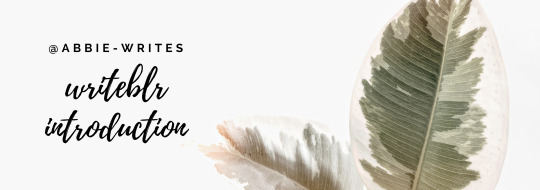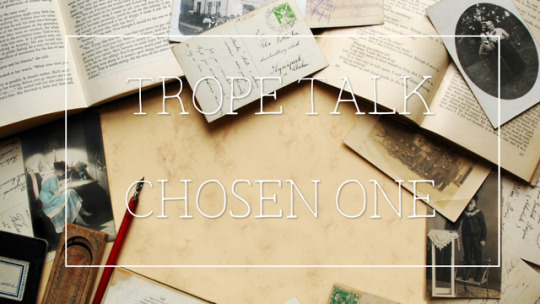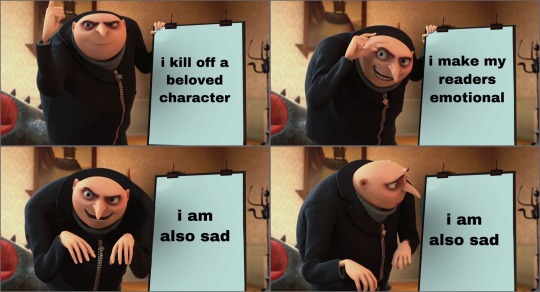Quote
Time you enjoy wasting is not wasted time.
Marthe Troly-Curtin
83 notes
·
View notes
Text
Killing off characters: the shoulds and shouldn’ts
1. Why you should
The death is a major plot point
It reveals some shocking plot twist
It supports your themes/what you’re trying to say with your book
Your novel explores the afterlife
You are George R.R Martin and the selling point of your work is that everybody dies
It suits the genre/mood of your novel
2. Why you shouldn’t
The character isn’t serving any purpose (this isn’t the Sims)
You want your readers to be shocked for the sake of being shocked
You want to be edgy
You think your MG story needs more gore
You want to romanticise grieving/loss
3. How you should
This really depends on your genre and target audience
If you’re writing something that isn’t intended to be graphic/traumatic, you can stick to the impact the death has on the other characters. If your novel explores illness, focus on that rather than on the disturbing death scene itself. Perhaps you’re writing a drama/tragic romance - you might want to ease up on the gore here. For these genres, I would suggest focusing on the emotional aspect of the death - the sobbing, the last words, the bright white lights (whatever floats your boat). Think of Mufasa in The Lion King - the actions are suspenseful, but we don’t see him being trampled with his guts spilling everywhere. But it’s still one of the most impactful deaths in fictional history.
If you’re writing in a more mature and gritty genre (like thriller, dark fantasy or crime), you can go all out. If there’s blood and guts, you readers probably want to see it in vivid detail to get their violence fix for the day.
Whichever genre your novel falls into, you should also go with what feels comfortable to you. Even if you’re writing adult dark fantasy, you don’t have to write graphic violence to make a character death impactful.
4. How you shouldn’t
Please don’t let your character have a three-pages-long monologue after they’ve been stabbed in the throat. It’s not realistic and it’s often very boring. Yes, a few well-written last words can have a great impact. Just make sure that your character would realistically be able to speak at that point and that it doesn’t become a cheese fest.
Unless you’re aiming for very dark/nihilistic humour, afford your characters some dignity in the way they kick the bucket. (e.g. don’t use the phrase “kick the bucket”). Having someone slip on a banana peel and then choke on a pretzel is a little ridiculous and will make the entire story seem silly. Once again, this really depends on what you’re going for. If your genre is serious and your character is important and beloved, try for emotion rather than whimsy.
Don’t let your characters die only to be resurrected again and again and again. Look, I love Supernatural (long may they reign), but even I have to admit that the Winchester brothers’ luck with death has become a bit ridiculous. Doing this takes away from the impact of the death - it removes the fear and suspense, and will leave your readers emotionally stunted.
5. Who you shouldn’t
Your only female character in a bid to make the male hero feel something and become a better person
Your only LGBTQIA+ character, who is just too pure to live in this terrible world
Your only character of colour, who dies to save the white hero
Your only disabled character, who can now finally find release from life with disability
The one character who has never experienced a sliver of joy and bears the brunt of the tragedy, right when happiness is finally within their reach
The main character in the middle of the story - unless you have a REALLY good plan for what happens next
Reblog if you found these tips useful. Comment with your own thoughts on killing off characters. Follow me for similar content.
19K notes
·
View notes
Quote
I can shake off everything as I write; my sorrows disappear, my courage is reborn.
Anne Frank
136 notes
·
View notes
Text
more fantasy gripes: i actually despise that the measure of whether or not you’re a good worldbuilder™ is based on how much irrelevant, extraneous detail you put into your books rather than whether or not your world is engaging, “believable” and immersive. i mean, so what if i don’t want to spend years of my life painstakingly detailing every past monarch’s favourite food or eye colour. why is that relevant?? why is that important?? what does this add to the story?? i think a lot of fantasy would be greatly improved if it wasn’t pages full of men wanking off about the boring minutiae of some local lord’s flag that will only ever appear once in the story and never again.
903 notes
·
View notes
Text
Congratulations, you are a writer! Prepare to get:
Characters popping up in your dreams
Characters popping up in your head everytime, like, damn it, Jason, I’m taking an exam here!
Weird habits you picked from your characters
The urge to make faces as you write because that’s what your characters are doing
Weird internet history
A really unsettling knowledge on poisons and murder in general
The urge to slam your face on your desk
Notebooks and notebooks cravings, even if you write on your computer
Those I wish there was more content for my characters. Oh, right. I have to make it moments.
The same daydream before falling asleep, and sometimes you cut it and restart from scrap, now with more feeling.
The urge to insert your new obsession in your current WIP but you don’t have guns in middle ages damn it.
The painful experience of wanting to tell everybody about it but at the same time not wanting anybody to know
A thousand ideas or none at all for months.
5K notes
·
View notes
Quote
I think all writing is a disease. You can’t stop it.
William Carlos Williams
39 notes
·
View notes
Text
Me, trying to name a character: Maybe...Rose? Nope, already got two of those. Hmmm Alex? Taken. Briar? Oh yeah she’s a side character in that thing I abandoned years ago. Delta? Can’t use that either
(And so on)
93 notes
·
View notes
Text
i really like planning out all of my stories. I like looking at my outline and feeling a sort of pride for something that doesn’t exist yet.
41 notes
·
View notes
Text
The different types of reading:
Reading like a reader: You’re letting the story take you a sweep you away without worrying much about anything. You might have opinions–likes and dislikes. But for the most part, you’re just seeing where the story takes you.
Reading like a writer: You’re gutting each sentence, picking it apart and studying it. You look at what the writer does wrong and what they’ve done right and use both to help you improve. You’re actively trying to find flaws and strengths to avoid or borrow in your own writing.
When to read like a reader:
When you want to relax and enjoy a story.
When you’re reading with intent to give feedback to other readers. This means reviews for sites like Goodreads or Amazon.
When to read like a writer:
When you’re looking to up your writing skills.
When you’re beta reading, critiquing, or giving feedback to the writer directly.
A lot of writers find it nearly impossible to read like a reader anymore, which isn’t a bad thing. You can still 100% relax into a story and enjoy it once you’ve built up that reading like a writer muscle. It does take more work than just reading, so if you’re just starting out you may find it hard at first.
If you do read like a writer, you can of course still review a novel. However, you can’t expect all your critiques to fit into a review. Reading like a writer is very tailored frame of opinion in most cases, as it partly relates to your own writing style. A review is not the place to compare your writings. It’s a place for other readers to find out if they should give this book a chance. Complimenting/complaining about sentence structure is nitpicky and going to go over most readers heads–just say it wasn’t/was well written.
Like most things, reading like a writer vs reader is a wide spectrum. Plenty of readers that are not in fact writers read like a writer–especially voracious readers because they have a whole career of reading behind them. They’ve learned how to weed out bad books.
Throughout the course of a book you can do both in varying degrees, but at times it can be good to consciously flex those muscles. Strain and relax them. Become a better writer without even writing ❤
630 notes
·
View notes
Quote
It is better to be hated for what you are than to be loved for what you are not.
André Gide
36 notes
·
View notes
Photo

about me
my name is abigail, but everyone calls me abbie!
19
she/her
zodiac sign: cancer
from NJ
gryffindor
my goals
write a new chapter for my WIP everyday (or every other day)
hopefully become published one day :)
my writing
currently writing a series (Zero, you can read it on wattpad and inkitt) but I’m still working on the first book
will be including LGBT+ and POC characters in my series, specifically for two of my supporting characters
I’m a visual planner so I see everything that happens in my book in my head before I write it down which is super helpful for description
I’m obsessed with dystopian novels so that’s what I’m mainly going to be writing
fun facts
I LOVE CATS, I have two tabbies and they are my babies
I have always been obsessed with horror movies, I’ve seen all the classics but my favorite series is the SAW franchise
I recently rewatched The Hunger Games and it inspired me to start writing my current WIP
looking to follow
that’s basically it! I’m currently looking for mutuals / people to follow so if you reblog / write / post:
ya
dystopian
scifi fantasy
fantasy
horror
mystery
then reblog this and I’ll check out your page!
93 notes
·
View notes
Text
“You’re a dick,” Jasper frowned.
“I know...” Konner smiled and suddenly he couldn’t be annoyed anymore. “But you love it.”
Goddammit he’s always right.
#writeblr#writing#writers#i like it#this is actually their relationship#i love them so much#my oc#my characters
12 notes
·
View notes
Text
WRITE WHATEVER
123 notes
·
View notes
Photo

Often when creating a protagonist, we writers want our hero to feel directly tied to the conflict of the story. Maybe a group of bandits murdered their family, or your protagonist’s boss is offering a job promotion; this is key for good storytelling. Your protagonist and their entrance into the wider plot must flow smoothly. However, a trope that is the exception to the rule is The Chosen One. The Chosen One’s arrival to the plot doesn’t need to be smooth whatsoever. The chosen one doesn’t need to be affected by the wider plot, perhaps even oblivious. It is up to you as a storyteller. The most common way The Chosen One trope is used in literature is the everyday hero.
This is the way it goes:
- Our ordinary protagonist is an ordinary person in your world.
- They are the Chosen by some mystic being or prophecy and are thrust into the conflict of the story.
Often the Chosen One and the origins of the everyday hero come hand in hand, but that is another trope.
Why This Trope Appeals to Audiences?
Who wouldn’t want to be the subject of a massive prophecy, for someone to validate all the hardships you have been through, for people to accept you immediately. Why wouldn’t you want to be told that you are more than special? This is what this trope brings to the table. The Chosen One can become a vessel for the audience to experience the same wonder as the character, something that gives us hope that someone will knock on our and ask us on a magical adventure.
Positive and Negative Traits of the Chosen One
Although the trope has many positives, the negative traits can often come to light if not written properly. The trope could potentially become a cliché which always hurt the quality of your piece of storytelling.
If your Chosen One is thrust into the story with no agency or is picked by a higher entity to solve a conflict that doesn’t affect them, ultimately they will become a weak protagonist. A way to make sure that your character isn’t weak is for them to reject their destiny or the inciting event. Make sure it is clear that want nothing to do with the conflict but something changes their mind. Your Chosen One sees what this conflict is doing to their normal world and ultimately want to fix it.
Although The Chosen One can become a cliché, it has many positive traits. The trope easily endears the audience to the character situation, understanding the applied pressure for a prophecy that might be millions of years old. Not only does this serve your protagonist external conflict but also their inner conflict. They might struggle with the responsibility of being the Chosen One. Not only does this provides a connection to the reader it is a relatable struggle in an unrelatable situation.
Subverting the Trope
The Chosen One trope is a useful trope if it isn’t written poorly just like any principle. However, most tropes work the best when they are flipped on their head when they completely catch the reader or audience on surprise. This is the same with The Chosen One. One of the best examples of this is in the Percy Jackson series. Through the first series of novels, Rick Riordan indicates the death of the main character Percy Jackson in order to save the world. This is however subverted, when Percy wasn’t the one to die at all, rather their friend turned enemy Luke. When I read this as a child, I was completely stunned. The way Riordan heavily pushed the idea of Percy dying made me believe it would happen, that the whole world would die without his sacrifice. This is what I liked to call the False Chosen One. Sure, The Chosen One is still the Chosen One, but an integral part of the prophecy isn’t about them at all.
Another subversion is that the Prophecy of The Chosen One is false, that it was all fake, maybe a part of a scheme to ultimately hurt those doing good. These, obviously, can be a downer but that doesn’t mean it’s not effective. Sometimes this subversion can promote the theme that you should be in control of your own destiny and to question authority, even if people feel uncomfortable with it.
There are so many more subversions of this trope that it would take another post to cover the majority of them.
Extra Notes
The Chosen One is really over used. Like a lot. Honestly, I am a bit bored of the trope, however it is the good idea to use it against the audience and that’s why I am so happy when it is subverted. If you remember any examples of this trope and it being subverted and you would like to discuss it will me, please do!
#writeblr#writing advice#advice for writers#writing community#writers on tumblr#writing tips#tips for writers#writing#write
734 notes
·
View notes
Quote
Kurt looks up at her then. An emotion crosses over his eyes and it’s like a wave, crashing on the shore then receding back into the ocean. “I did.”
from my new wip novella, The Empty Shell (via pe-ersona)
17 notes
·
View notes

